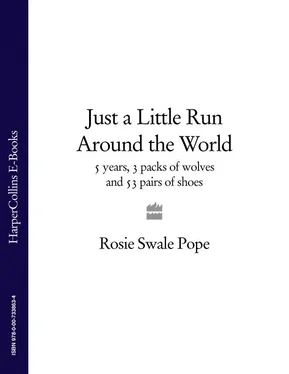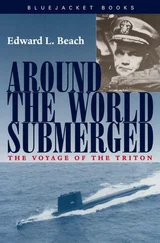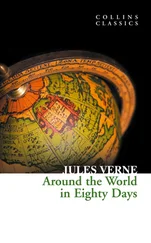ROSIE SWALE POPE
Just a Little
Run Around
the World
5 years,
3 packs of wolves and
53 pairs of shoes

‘Things last for ever,
not in years, but in the moments
in which they happen.’
—Rosie Swale Pope
For Clive, Eve and James, Pete, Jayne and Nigel and the rest of my family far and wide.
Prologue
Chapter 1 - Clive
Chapter 2 - The Plan
Chapter 3 - The Tenby Bear
Chapter 4 - Eyes in Your Feet
Chapter 5 - Eric the Wild Boar
Chapter 6 - Need Makes the Naked Lady Spin
Chapter 7 - Rip Van Winkle in a Snow-hole
Chapter 8 - Touching the Stars
Chapter 9 - A Stranger is Family
Chapter 10 - The World of Special So-called Ordinary People
Chapter 11 - Shaken not Stirred
Chapter 12 - The Rising of the Phoenix
Chapter 13 - To Russia with Love
Chapter 14 - Unstoppable Friend
Chapter 15 - Paw-prints in the Snow
Chapter 16 - Kitezh: Bad Times Can End
Chapter 17 - The Axeman Cometh
Chapter 18 - Running into Asia
Chapter 19 - Omsk: The First Race
Chapter 20 - Bandit on a Bicycle
Chapter 21 - In a Siberian Hospital
Chapter 22 - Winter in Siberia
Chapter 23 - A Siberian Bridge Has No Middle
Chapter 24 - Falling in Love with Alaska
Chapter 25 - There’s No Place Like Nome
Chapter 26 - Surviving in Alaska
Chapter 27 - Topkok
Chapter 28 - White Mountain
Chapter 29 - Breaking the Ice
Chapter 30 - Crazy Rogue
Chapter 31 - The Comeback
Chapter 32 - Reunion
Chapter 33 - Ballad of the Red Toenails
Chapter 34 - Life Is a Marathon
Chapter 35 - I Am the Wildlife
Chapter 36 - Running Against the Current
Chapter 37 - New York, New York
Chapter 38 - Goodbye Charlie, Hello Icebird
Chapter 39 - The Most Beautiful Sound in the World
Chapter 40 - The World’s Largest Island
Chapter 41 - Vikings with Golden Hearts
Chapter 42 - Thor’s Hammer and Thorgeir’s Teabags
Chapter 43 - Just a Little Run Down Britain
Chapter 44 - The Last Frontier
Chapter 45 - Homecoming
Epilogue
Author’s notes
Acknowledgements
Further Information
Copyright
About the Publisher
Siberia, January 2005
There are a hundred different types of silence in Siberia. The atmosphere becomes part of you. You can sometimes see bare white silver birches in the depth of winter hung with stars on a clear night. In the mesmerising vast forests, dusk in January begins at 2 pm. By then everything is in its hole or nest—or nearly everything.
On a cold, still night, I pull my cart that doubles as a sled, deep into the forest and find some smooth snow among the trees. I put up the tent, collect a bowl of fresh snow to take inside with me to melt on the tiny primus stove for drinks and cooking; it’s the nearest thing I have to a kitchen. I have even gathered some icy tree bark from the fallen branches to make tea. The Siberian people have taught me this. It’s not quite PG Tips but it’s nourishing and tastes fine. Need is a great teacher. I also boil up a few handfuls of buckwheat grain to make a kind of porridge. It’s a measure of the power of the silence that even a light footstep outside can make your heart stop. Something is out there.
The night birds—maybe they are jays—suddenly start screeching and chattering. Alert. Out from their hiding places. Gone is their silent vigil. They are harsh calls of warning. Then I hear the howling.
Moments later the wolf has stuck his head right into the tent. My first impression isn’t one of danger or fear but of his absolute beauty. He is a great big timber wolf. His tawny head and long front legs with giant-looking furry paws are covered with drops of half-frozen snow that gleam like diamonds on his thick fur. He has a good look around, as though I should have been expecting his visit. Maybe I am. After all, this is his world.
My heart is thundering. Yet my strongest instinct is that he’s not going to attack me. I have learned to trust my instinct. It’s all I have. I stay quiet, but the wolf knows I’m shaken. You can’t pretend to animals. They always know how you feel. Then he backs away and he’s gone.
I have to go out to repair the ripped tent flap with duct tape. The moon has risen, revealing a pack of wolves waiting like grey shadows among the trees.
The next morning they have left but they come back again at the end of the day when I set up camp. I am on a desolate road that stretches for miles through the forest. I’ve only observed one or two vehicles over the last few days travelling to the mines in the far east of Russia. There are no houses for hundreds of miles and I wonder if these wolves have seen a human before. Perhaps I’m just part of the wildlife.
Over the next few days they disappear at daylight and reappear when I stop for the night. They never come close to the tent again or harm me. It is as if they are running with me. They always gather for the night quite a distance away. I’m uneasy—yet at the same time their presence comforts me in a way I don’t quite understand. After about a week they vanish. I believe it’s because I’ve left their terrain; I have crossed an invisible border.
These beautiful wolves with their ancient, strange ways gave me courage to think of the painful memories of why my run had begun.
On 12 June 2002 my husband Clive died in my arms of prostate cancer. I knew with a passionate conviction that I had to do something. To tell people, to remind them to please go for health checks. If Clive and I had thought about him going to the doctor earlier—perhaps he would be with me now. I had to find a way to make others listen, especially men and women who hate going to the doctor and discussing intimate things. There is no social status with cancer. I’m only an ordinary woman, but if I just stayed home doing the weeding in my backyard, nobody would have taken any notice—that’s why I am running around the world, and sleeping in the cold in the forests with wolves.
If my message saves even one life—it will all have been worthwhile.
Tenby, Wales, 2002
We thought he could beat it, just as Clive had always conquered everything. Years ago, he sailed practically everywhere in the world, delivering yachts. He sailed boats no one else could manage. He escaped from pirates on the high seas, weathered all storms. He had always been fit, and very full of life and laughter.
Clive had twinkling blue eyes in an inquisitive and happy face; you could stop to chat to him for a moment—and still be talking hours later. I met him in 1982, when I had been at a low point, struggling to get an old and ramshackle 17ft sailing boat ready to sail solo across the Atlantic. Although he was a businessman in Pembrokeshire, he couldn’t stay away from the sea, and was helping out at Kelpie’s Boatyard in Pembroke Dock, where he rigged my little boat. Clive had been married before like me and had two deeply loved grown-up children, Jayne and Nigel. I was also very close to Eve and James, my children from my first marriage.
After I completed my solo voyage, we had a simple wedding and nearly twenty extremely happy years together. We would walk or run down to the sea and look at the sunrise, making a golden path of light across the sea from the harbour and North Beach in Tenby where we lived.
‘I think heaven isn’t later,’ he often said. ‘Heaven’s right here on this earth.’
Читать дальше













